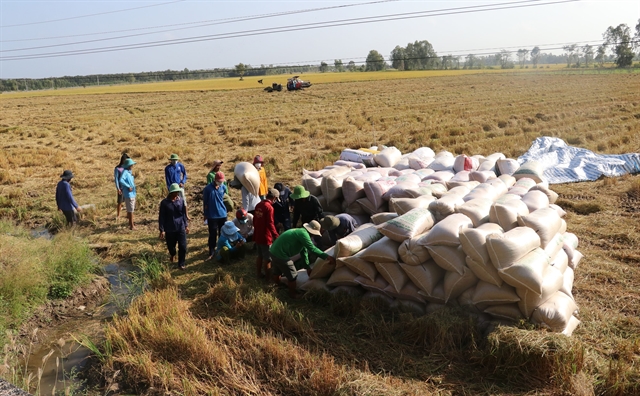 Society
Society

The Cửu Long (Mekong) Delta province of Đồng Tháp aims to expand the area under high-quality rice to meet both domestic and export demand.

|
| Farmers harvest the 2021 - 22 winter - spring rice in Đồng Tháp Province’s Cao Lãnh District. — VNA/VNS Photo Nguyễn Văn Trí |
ĐỒNG THÁP — The Cửu Long (Mekong) Delta province of Đồng Tháp aims to expand the area under high-quality rice to meet both domestic and export demand.
One of the country’s main rice producing provinces, it grows three crops a year on more than 500,000ha, and has an annual output of 3.3 million tonnes.
It grows various types of high quality rice like Ngọc đỏ hương dứa, Huyết rồng, Lứt đỏ, Nàng hoa, Thần nông xanh, ST 24, and ST 25 to Vietnamese and global good agricultural practices (VietGAP and GlobalGAP) and other quality standards.
Ngọc đỏ hương dứa, for instance, is delicious and soft and has the delightful flavour of pandan leaves. It is grown to organic standards by the Định An Seed Co-operative in Lấp Vò District.
More and more rice co-operatives growing high-quality varieties on large areas have been linking up with companies to have guaranteed buyers.
The Mỹ Đông 2 Agriculture Services Co-operative in Tháp Mười District, for instance, has contracts with companies to grow the grain on more than 1,000ha.
Mỹ Đông 2 uses advanced techniques and has mechanised all stages of cultivation until harvest.
It uses alternating wet and dry irrigation techniques with automatic pumping facilities to save water, smart fertilisers to fertilise rice just once and drones to spray pesticides to mitigate their adverse impacts on farmers’ health.
The use of sowing machines helps the co-operative reduce the quantity of rice seeds to 60 kilogrammes per hectare from 80kg under traditional methods.
Ngô Phước Dũng, director of Mỹ Đông 2, said the co-operative’s income was VNĐ5-8 million ($220 -350) per hectare more than from traditional farming methods.
The province has taken various measures to help companies and farmers choose high-quality varieties for cultivation to improve quality and value.
Nguyễn Văn Nguyện, chairman of the province Farmers Association, said a contest was organised recently to enable farmers and companies to promote their varieties and seek new varieties to diversify.
The contest also honoured researchers and farmers who grow clean and high-quality varieties using environment-friendly methods.
The province is encouraging linkages between farmers and rice producing and trading companies for growing high-quality rice on a large scale for export.
In the 2021-22 winter-spring crop the province planted 189,125ha and is expected to have a high yield of seven tonnes per hectare. Besides, it expanded the cultivation of high-quality varieties and use of advanced farming techniques.
Huỳnh Tấn Đạt, deputy director of the province Department of Agriculture and Rural Development, said localities had been instructed to use advanced farming techniques like ‘one must and five reductions’, integrated pest management and proper use of irrigation and fertilisers.
These had helped rice crops grow well, reduce costs and improve quality and farmers’ incomes, he added.
Conversion
Đồng Tháp farmers have switched to perennial fruits and other crops or rotating between rice and other crops on more than 10,000ha of unproductive rice fields since 2021.
Of the fields 5,000ha are under perennial fruits like mango, orange, mandarin, jackfruit, and longan and the rest grow short-term crops like corn, sesame, red chilli, sweet potato, taro, lotus, and beans.
Lê Văn Ngọt in Tháp Mười District’s Mỹ Hoà Commune rotates rice and lotus on his 4ha field and earns more than VNĐ300 million (US$13,100) from each lotus crop.
The rotation also prevents the spread of rice disease pathogens, he said.
Besides, he provides tourism services on his lotus field during the flooding season to earn more money.
The province, well known as the land of pink lotuses, has 800ha under the flower, mostly in Tháp Mười, Cao Lãnh, Thanh Bình, and Tam Nông districts.
The income from short-term crops is two or three times as that from rice while perennial fruits fetch up to eight times the income, according to the department.
Đạt, deputy director of the department, said: “The conversion of rice fields is aimed at saving irrigation water, bring back soil fertility and prevent the spread of rice disease pathogens.”
The department was encouraging farmers whose rice fields are unproductive to grow high-value crops, he said.
The province plans to convert around 9,400ha of rice fields this year, according to its People’s Committee. — VNS




